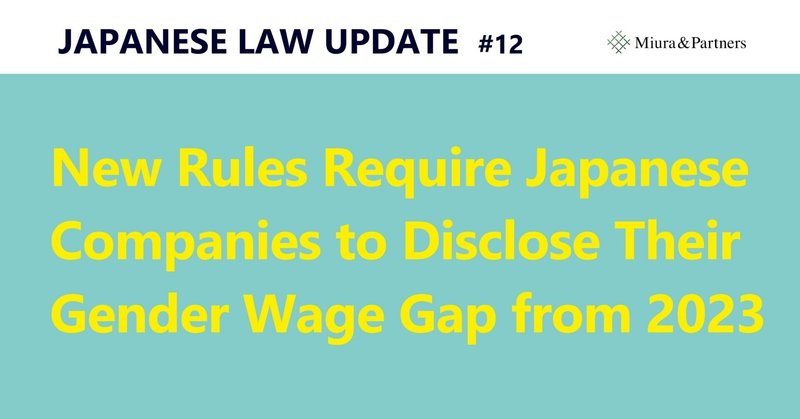
Japanese Law Update #12: New Rules Require Japanese Companies to Disclose Their Gender Wage Gap from 2023
In June 2022, the Japanese government announced its framework policy plan called the “Framework Policies” (honebuto no hoshin, the “Policies”). The Policies require Japanese companies to increase the transparency of their gender wage gap in two ways; (a) disclosing the wage gap at companies’ websites or other relevant methods, and (b) disclosing the wage gap in annual securities reports. Japan was ranked 120th out of 156 in the 2021 edition of the Gender Gap Index, the lowest level among developed countries. The OECD survey shows that the wage gap between men and women in Japan is 22.1% in 2021. The gap is much larger compared to 11.7%, which is the average of OECD countries in 2020. The new disclosure requirements are expected to encourage companies to increase the gender equality at workplace.
1. Wage Gap Disclosure Rules for Companies with More Than 301 Employees
From 2023, Japanese companies with more than 301 employees on a regular basis which fall within the categories of “Large Company" under the Act on Promotion of Women’s Participation and Advancement in the Workplace (the “Act”) will be required to disclose the wage gap between men and women on their websites or by other relevant methods. The Ministry of Health, Labor and Welfare expeditiously drafted the relevant revisions to the Ministerial Ordinance of the Act after the announcement of the Policies in June 2022.
According to the draft revisions to the Ministerial Ordinance of the Act, a Large Company shall disclose the wage gap calculated by dividing the average annual wage of women employees by the average annual wage of male employees. A Large Company shall disclose the wage gap in separate categories of (a)all workers, (b)regular employees (seiki koyo) who have full protections under labor law, and (c)irregular employees (hi seiki koyo) who have limited protections under labor law. The company needs to disclose its wage gap on a non-consolidated basis.
According to media report, the new rules come into force in July 2022. Therefore, a Large Company shall disclose the wage gap from the first fiscal year on or after July 2022. In Japan, most companies’ fiscal year ends at the end of March. For those companies, they need to begin disclosing the wage gap of the current fiscal year from April 2022 to March 2023 after the fiscal year ends in 2023.
2. The Wage Gap Disclosure in the Annual Reports
The Policies also require listed Japanese companies to disclose the wage gap between men and women in their annual securities reports in addition to the requirements under the Act above. The Policies identify that a wage gap has significance in companies’ mid-term and long-term growth. The details of the new rules are under discussion at the Disclosure Working Group at the Financial Services Agency's Financial System Council (the "DWG"). A report by DWG points out that companies should disclose the gender wage gap at the "Status of Employees" section of the annual securities reports. According to media report, the new rules may be implemented from the fiscal year 2023, beginning April 2023 at the earliest.
With the new disclosure rules, Japanese companies need to improve their gender equality to attract favorable candidates in the job market as well as more investors in the securities market.
Author
Yoshie Midorikawa, Partner
Yoshie Midorikawa has extensive experience in complex disputes and arbitration. Having worked with leading law firms in Japan and Singapore, she has handled parallel proceedings across multiple jurisdictions as well as domestic disputes before Japanese courts. She has also served as a board member of listed companies in Japan, improving their corporate governance. Her deep understanding of the civil law system, her working experience in international environments, including common law jurisdictions, and her knowledge of business, enable her to bring practical and nuanced legal solutions to international businesses. She is listed among “Best Lawyers in Japan (Litigation)” in the editions of 2021, 2022, and 2023, “Best Lawyers in Japan 2021(Corporate Governance & Compliance)” in the edition of 2023 by Best Lawyers.
The contents of publication are intended to provide general information only and do not contain or convey any legal or other advice.
この記事が気に入ったらサポートをしてみませんか?
